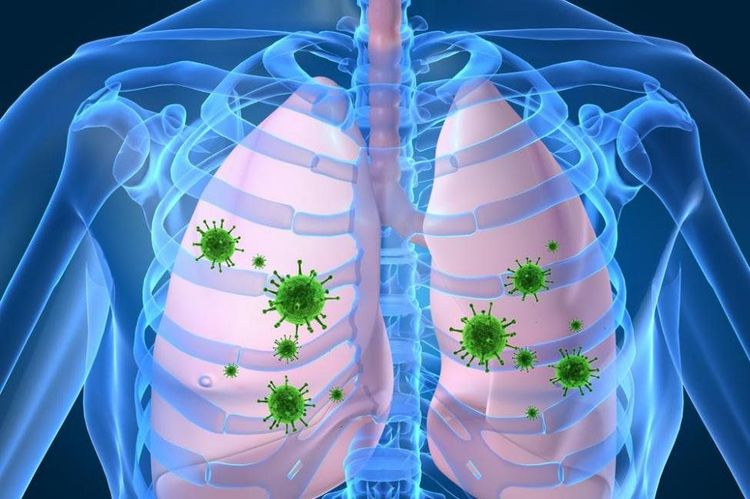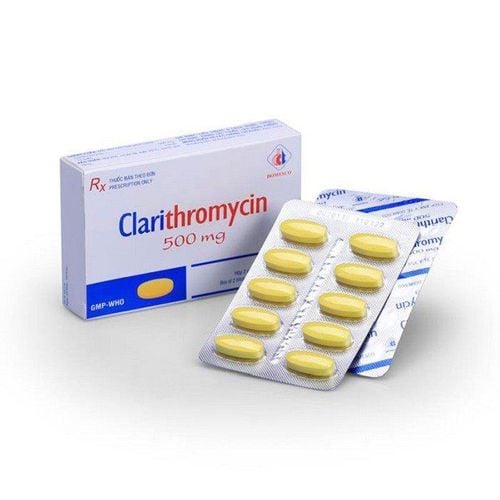This article is medically advised by Phan Dinh Thuy Tien, MD - General Internal Practitioner - Department of General Examination & Internal Medicine - Vinmec International Hospital Nha Trang.
Rhinovirus primarily causes the common cold and upper respiratory tract infections. Most cases present with mild symptoms and resolve on their own. However, under favorable conditions, Rhinovirus can proliferate and cause pneumonia, which severely affects the patient's health.
1. General characteristics of Rhinovirus
Rhinovirus is the main pathogen responsible for the common cold in humans. It belongs to the Picornaviridae family, with sizes ranging from 20 - 27 nm, and more than 100 different serotypes. Rhinovirus thrives in temperatures between 33°C and 37°C but is easily destroyed by stomach acid. Therefore, it does not cause gastrointestinal infections like enteric viruses.
Rhinovirus spreads through two main transmission methods: direct transmission (through inhaling respiratory droplets from an infected person at close range) and indirect transmission (through contaminated surfaces such as hands, toys, tabletops, chairs, door handles, etc., infected with nasal secretions or respiratory droplets from an infected individual). The virus enters the body through the upper respiratory tract and remains localized there. The incubation period is about 2- 4 days, then causes symptoms such as sneezing, runny nose, mild fever, sore throat, coughing, headaches, occasional chills, and hoarseness. The illness typically lasts about a week and resolves on its own.
The common cold caused by Rhinovirus is more prevalent in the winter-spring seasons, and while anyone can contract it, children are at higher risk. Vulnerable groups such as children, the elderly, and individuals with chronic diseases or compromised immune systems should be particularly cautious to avoid the complications of Rhinovirus infection, which may lead to more severe conditions.

2. Rhinovirus can cause severe pneumonia
In children who are malnourished, have prolonged cold exposure, or have weakened immune systems, a Rhinovirus infection can lead to complications such as bronchitis, bronchopneumonia, or secondary bacterial pneumonia. Furthermore, other respiratory viruses such as coronavirus, Coxsackievirus, influenza C virus, and respiratory syncytial virus (RSV),... can also cause cold-like symptoms and co-infect with Rhinovirus, worsening the condition. Prolonged cold weather provides an opportunity for Rhinovirus to thrive and significantly damage the patient's health.
Several cases of severe pneumonia caused by Rhinovirus infection have resulted in fatalities due to delayed hospital admission when the patient was in critical condition with pneumonia, multi-organ failure,... At present, there is no specific antiviral treatment for Rhinovirus. Doctors can only offer supportive care to boost the patient's immune system to fight the virus.
If Rhinovirus pneumonia patients are not isolated early, the virus may spread rapidly, particularly among vulnerable children with weakened immune systems.

3. Treatment and prevention of Rhinovirus infection
The common cold caused by Rhinovirus is generally mild and resolves within a week. Treatment usually focuses on alleviating symptoms such as cough, fever, and improving the patient’s overall health by encouraging rest. There is currently no specific antiviral medication for Rhinovirus. Clinically, nebulized interferon-alpha 2b, nasal ipratropium, and oral naproxen have shown positive effects. Research into a vaccine for Rhinovirus is challenging due to the more than 100 serotypes of the virus, with immunity being serotype-specific and lacking cross-protection.
Preventive measures against Rhinovirus infection include:
- Personal hygiene: Regular handwashing with soap, using disinfectant wipes (e.g., iodine solution) to clean hands, avoiding touching the eyes and nose, and using nasal, throat, and eye disinfectants like saline solution or garlic water.
- Limiting exposure to infected individuals: Avoiding contact with sick people, wearing medical masks, glasses, hats, and coats when around infected individuals, and avoiding crowded spaces, especially poorly ventilated areas during outbreaks.
- Improving overall health: Proper diet, regular physical exercise, and keeping the body warm to avoid cold exposure (e.g., dressing warmly, avoiding rain, and not wading in cold water).
- Seeking medical care promptly: When symptoms of an acute respiratory infection appear, patients should visit healthcare facilities for early diagnosis and appropriate treatment.
As Rhinovirus spreads easily through respiratory droplets, it can develop into an epidemic. While there is currently no specific antiviral treatment, parents should focus on keeping their children warm and maintaining personal hygiene. If children show respiratory symptoms such as coughing, sneezing, runny nose, or mild fever,... they should be taken to specialized medical facilities. In necessary cases, chest X-rays and viral tests should be conducted to detect the infection early and initiate appropriate treatment.
To arrange an appointment, please call HOTLINE or make your reservation directly HERE. You may also download the MyVinmec app to schedule appointments faster and manage your reservations more conveniently.













